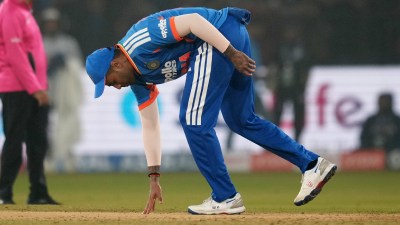One third women face assault during a lifetime: UN
A series being telecast on BBC television highlights the vulnerability of women to abuse all over the world.

One-third of the women worldwide are likely to face sexual or physical assault both at home and at workplace during their lifetime, according to a UN-backed television series.
The series being telecast on BBC television highlights the vulnerability of women to abuse in different parts of the world.
8220;Even where there is no war, women8217;s bodies continue to be battlegrounds,8221; says Thoraya Ahmed Obaid, Executive Director of the UN Population Fund UNFPA, which along with other UN agencies provided information for 8216;Women on the Frontline8217;, the seven-part investigative series by BBC World.
8220;Women and girls are at risk of violence when carrying out essential daily activities within their homes, or while walking, taking public transport to work, collecting water or firewood,8221; Obaid says.
8220;Demanding the end of violence against women is about protecting human rights and ensuring that women live in safety and dignity,8221; he adds.
British singer Annie Lennox, who is presenting the series, stresses that violence against the fair sex threatens the lives of more young women than cancer, malaria or war.
8220;It affects one in three women worldwide. It leaves women mentally scarred for life, and it is usually inflicted by a family member,8221; she says.
Trafficking, sexual harassment, female genital mutilation, dowry murder, 8216;honour8217; killings and female infanticide are also part of the problem, highlights the programme.
8220;The gaps in addressing violence against women are in terms of political will, resources and the strong involvement of men and boys in insisting on zero tolerance,8221; says Joanne Sandler, acting Executive Director of the UN Development Fund for Women UNIFEM.
8220;If we can8217;t put an end to the pandemic of violence against women, we can8217;t achieve any of the other agreed goals: development, equality or peace,8221; she says.
The seven part series covers Nepal, where thousands of women are trafficked each year, Turkey, where killing in the name of honour continues besides Morocco, where women political activists who have survived torture and imprisonment testify before a Government truth and reconciliation commission.
The series also features episodes on Democratic Republic of Congo DRC, where women bear the brunt of a 10-year war in eastern provinces, Colombia, where women have been tortured in the shadow of a guerilla war, Mauritania, where women who have been raped may go to prison and Austria, where under a new law, perpetrators of domestic violence are forced to leave home.
8220;We found girls who said they had been raped and who were being sent to prison for the simple reason that there was no tangible proof of this violence,8221; says Zeinabou Mint Taleb Moussa, a lawyer who heads the Mauritanian Association for Maternal and Child Health.
8220;I would prefer them to go through the justice system or even better, I would prefer that the boys are arrested and the girls are recognized as victims,8221; he adds.
Acknowledging the depth of the problem, UN Secretary-General Ban Ki-moon, launched a multi-year campaign eight weeks ago, joined by a number of UN agencies to eliminate the scourge of violence against women.
- 01
- 02
- 03
- 04
- 05































